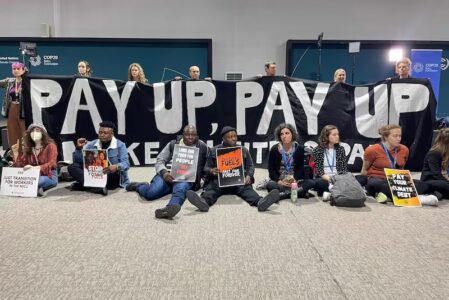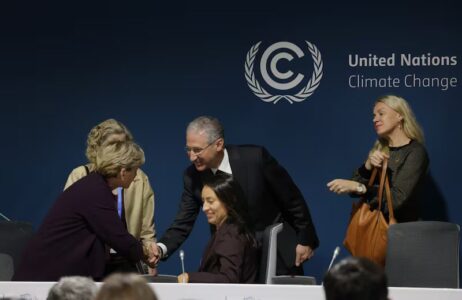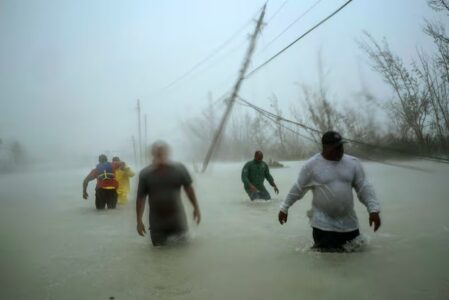Talks about a $1 trillion a year fund to fight climate change are fractured over the issue of who will pay, as rising economies such as China, Brazil and India resist pressure to split the bill, The National has been told. One negotiator described a “series of deadlocks” at the Cop29 summit in Azerbaijan, with poorer countries at odds over whether to accept proposals from the US and Europe to pass the collection bucket beyond the developed world.
Almost 200 countries taking part in the talks have days left to agree on the terms of the vast financial pledge to pay for green policies to curb global warming at 1.5°C above pre-industrial levels and fund disaster preparation and recovery where it is too late. Suggestions include billing the world’s top historical polluters, which could put China and Russia on the hook, linking contributions to a level of income that could bring in Middle East states, or asking for payments from a less defined group such as “countries in a position to do so”.
The proposals to divide the bill would favour small island states and the world’s least-developed nations, but have so far not been accepted by a large group of small and medium-sized economies called the G77 plus China. Uganda’s top negotiator, Bob Natifu, said there had been “a series of deadlocks, even within the G77” amid fears of damaging the interests of the powerful group.
“Our vulnerability is far different from the vulnerability of Kenya, the vulnerability of China, the vulnerability of India”, he told The National. Mr Natifu said he did not see the rich world relenting on its view that private investors should play a key role. “I don’t know how it’s going to be navigated, because when you look at the discussions, developed versus developing, you see very clear fractures and very clear red lines,” he said.

Current donors
Existing UN treaties ask developed countries to fund the climate fight. A list of 24 donors drawn up in 1992 includes the US, Canada, Australia, New Zealand and Japan; the EU and its then-members Germany, France, Italy, the Netherlands, Belgium, Luxembourg, Britain, Ireland, Denmark, Greece, Spain and Portugal; and non-members or later joiners Austria, Finland, Sweden, Switzerland, Norway and Iceland. In 2009 they agreed to arrange $100 billion a year by 2020, a deadline they missed. Cop29 is negotiating what comes next.
The US and Europe say a rethink of the donor base is overdue. Jake Levine, a special assistant to US President Joe Biden taking part in Cop29, said that when the magnitude of the challenge is considered “we do not see a future that doesn’t include everybody.”
China told Cop29 it has arranged more than $24 billion for developing countries but is reluctant to be pinned down by UN rules, saying previous texts “should be upheld”. Kenya called it a “divisive discussion”, while India said the Paris Agreement “is clear on who is to provide and mobilise the climate finance – it is the developed countries”. Brazil’s Climate Secretary told The National it was up to the rich world to pay.

On the table
Draft texts show little progress in narrowing down options. One would call the new pledge “the sole obligation of developed countries”, while another would seek funds “from all sources, public and private”.
In one proposal, countries would pay if they have a per capita income above $52,000, which would include the UAE, Qatar and Kuwait. The UAE last year pledged $100 million to a disaster fund set up at Cop28 and launched a $30 billion climate investment fund called Alterra.
A second proposed trigger would be emissions in the world’s top 10 historically, which would bring in China and Russia. Other proposals would keep things vaguer by referring to “higher emitters” or “capable parties”. Most proposals are for a sum of at least $1 trillion a year, and the EU’s chief negotiator has acknowledged there are “trillion-dollar needs”.
India raised the stakes by asking for $1.3 trillion a year, which one German official said was “certainly not achievable”. The goal could be split into a smaller sum to be provided directly by governments, in the hope of spurring investors to make up the rest. The Arab Group has suggested a $441 billion base.

Many in Baku are wary of strings-attached private funds, but governments are stretched. “We all know there’s not enough public finance in the world to get to net zero,” said Chris Hayward, the chairman of the City of London Corporation, which governs the UK’s financial district.
He said investors need political certainty – something in short supply at Cop29 as the world braces for a second Donald Trump presidency – to release funds. “There’s nothing that destabilises investment like inconsistency from politicians,” he said, as he welcomed new targets set by the UK, the UAE and Brazil.
“If they can see a commitment to public finance, it gives much more confidence to the private sector finance as well to come on board,” he said. “They would say, with some justification, if public finance isn’t going to invest, why should we?”
Failure to reach a deal in Baku would mean a February deadline for countries to submit new climate plans arrives with their financial firepower still in doubt. By then, Mr Trump will be back in the White House. August Pfluger, a member of the US House of Representatives attending Cop29, said the incoming Republican-controlled Congress would “take a look” at any commitments that are “not in support of lowering energy costs while reducing emissions”.
Mr Natifu said he was “cautiously optimistic” that Mr Trump would not quit the UN process altogether because of his closeness to electric car tycoon Elon Musk. “The trick would be, how do we try to engage people like Elon Musk, who are working closely with him?”, he said. A total US withdrawal “would create a slump in the momentum that has already been created, and may not allow us to meet the targets that we’ve set ourselves to achieve.”



